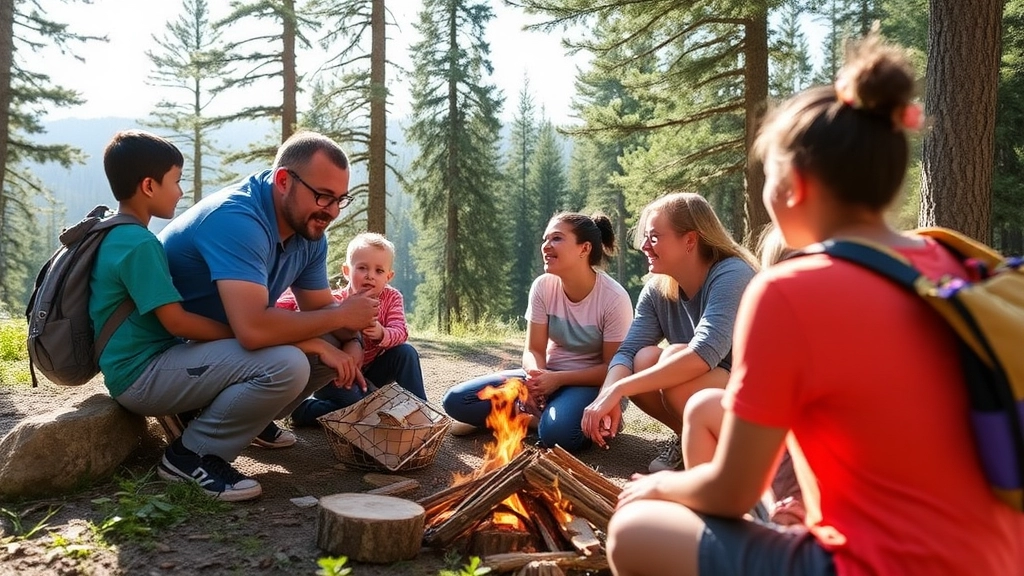Stepping into the Role of a Summer Camp Lead
Stepping into the role of a Summer Camp Lead is no small feat. This article delves into the multifaceted responsibilities that come with the position, from ensuring camper safety to crafting engaging programs. We’ll explore the essential skills needed for effective camp leadership and discuss the importance of continuous training and development. Additionally, we’ll provide insights into hiring strategies, tackling common challenges, and building a cohesive leadership team to maximize the positive impact on campers.
Understanding Camp Leadership
Whether you’re a seasoned camp director or an aspiring leader, understanding the intricacies of camp leadership is crucial. This article will guide you through the key elements that make a Summer Camp Lead successful, including real-life examples and practical solutions.
Key Elements of Success
- Fostering a Positive Camp Culture
- Enhancing Communication with Parents
Dive in to learn how to create an unforgettable camp experience that leaves a lasting impression on every camper.
Key Responsibilities of a Summer Camp Lead
Alright, let’s cut to the chase. What exactly does a Summer Camp Lead do? If you’re thinking about stepping into this role or just curious, you’re probably wondering how you can make a real impact. Let’s break it down.
Ensuring Safety and Well-being
First and foremost, safety is your number one priority. This isn’t just about avoiding accidents; it’s about creating an environment where kids feel secure and supported. Here’s what that looks like:
- Conducting regular safety checks
- Implementing emergency protocols
- Keeping a vigilant eye on campers and staff
Programme Planning and Execution
You’ve got to keep those kids engaged. A Summer Camp Lead is responsible for designing and executing a dynamic programme that balances fun and learning. Think of it as creating a blockbuster movie â it’s got to have variety, excitement, and a bit of heart.
- Crafting daily schedules
- Organising special events and activities
- Ensuring a mix of physical, creative, and educational activities
Staff Management and Mentorship
Your team is your backbone. You need to lead by example and keep everyone motivated. This means:
- Training and supervising camp counsellors
- Providing ongoing feedback and support
- Resolving conflicts and building team spirit
Communication with Parents and Guardians
Parents need to know their kids are in good hands. A Summer Camp Lead must maintain clear, open lines of communication with parents and guardians. This involves:
- Sending regular updates and newsletters
- Addressing concerns promptly
- Organising parent meetings and events
Administrative Duties
Yeah, it’s not all fun and games. There’s some behind-the-scenes work that keeps the camp running smoothly. This includes:
- Managing budgets and resources
- Keeping accurate records
- Ensuring compliance with local regulations
Creating a Positive Camp Culture
Your attitude sets the tone. A great Summer Camp Lead fosters an inclusive, positive camp culture where every camper feels valued and included. This means:
- Promoting respect and kindness
- Celebrating diversity
- Encouraging teamwork and collaboration
Real Talk: Stories and Examples
Let’s get real for a moment. Imagine this: it’s the first day of camp, and a camper is feeling homesick. They’re on the verge of tears, and you can see the anxiety in their eyes. As a Summer Camp Lead, you step in, offer a comforting word, and pair them up with a friendly counsellor. By the end of the day, they’re laughing and playing with new friends. That’s the kind of impact you can have.
Or consider this: your team is struggling to keep up with the packed schedule. You notice the stress and decide to hold a quick meeting. You listen to their concerns, adjust the plan, and boost their morale with some encouraging words. Suddenly, the energy shifts, and everyone’s back on track.
For more insights on creating engaging programs, check out our Engaging Summer Camp Curriculum Guide. If you’re looking for tips to ensure safety and well-being, our Ultimate Guide to Being a Summer Camp Director has got you covered.
Essential Skills for Effective Camp Leadership

Ever wondered what makes a good summer camp leader?
It’s not just about being the loudest or the most fun.
It’s about having the right skills to keep things running smoothly and ensuring every camper has a blast.
Let’s break it down.
Communication is Key
First off, communication.
You’ve got to be able to talk to kids, parents, and other staff members.
And it’s not just about talking.
Listening is just as important.
- Clear Instructions: Make sure everyone knows what’s happening and what’s expected.
- Active Listening: Pay attention to what campers and staff are saying. It helps you catch issues early.
- Conflict Resolution: Be ready to step in and sort out any disagreements quickly and fairly.
Leadership and Decision-Making
Next up, leadership.
You’re the one everyone looks up to.
You need to make decisions that keep the camp safe and fun.
- Quick Thinking: Sometimes you’ve got to make decisions on the fly.
- Confidence: Believe in your choices and others will too.
- Delegation: Know when to hand off tasks to others. You can’t do it all yourself.
Safety Awareness
Safety isn’t just a buzzword.
It’s your number one priority.
- First Aid Knowledge: Be prepared for any minor injuries or health issues.
- Risk Assessment: Always be on the lookout for potential hazards.
- Emergency Procedures: Know the plan and make sure everyone else does too.
Empathy and Patience
Working with kids requires a lot of empathy and patience.
It’s not always easy, but it’s crucial.
- Understanding: Get to know each camper. Everyone’s different.
- Patience: Sometimes things don’t go as planned. Stay calm and handle it.
- Encouragement: Boost campers’ confidence. A little praise goes a long way.
Organisational Skills
Last but not least, you’ve got to be organised.
A well-run camp is a happy camp.
- Time Management: Keep activities running on schedule.
- Resource Management: Make sure you’ve got everything you need.
- Planning: Have a plan B (and C) for when things go sideways.
Real-Life Example
Imagine this:
You’re leading a group of ten-year-olds on a nature hike.
Halfway through, one of them twists an ankle.
Your communication skills kick in.
You calmly explain the situation to the group and delegate tasks.
Someone calls for help, another fetches the first aid kit, and you stay with the injured camper, reassuring them.
That’s effective camp leadership in action.
Training and Development for Summer Camp Leaders
Worried about how to train your camp leaders effectively?
You’re not alone. Many camp directors stress over whether their leadership team is ready to handle the chaos and magic of summer camp. Let’s break it down and make it easy.
Why Training Matters
First off, why is training so crucial? Simple. A well-trained leader can make or break the camper’s experience. They need to know how to handle emergencies, engage kids, and keep the energy high.
Core Training Components
Here’s what you need to cover:
- Safety Protocols: Safety is non-negotiable. Leaders should know first aid, emergency procedures, and how to handle various situations.
- Activity Planning: Teach them how to design and execute engaging activities. Bored kids are a recipe for disaster.
- Conflict Resolution: Equip them with skills to handle disputes among campers. A peaceful camp is a happy camp.
- Communication Skills: They need to be excellent communicators, both with campers and fellow staff.
Training Methods That Work
Now, how do you deliver this training? Here are some tried-and-true methods:
- Workshops: Interactive sessions where leaders can learn and practice new skills.
- Role-Playing: Simulate real-life scenarios to prepare them for anything.
- Online Modules: For the tech-savvy, offer online courses they can complete at their own pace.
- Mentorship: Pair new leaders with experienced ones for hands-on learning.
Real-Life Example
Take Sarah, a camp leader who was initially overwhelmed. After going through a rigorous training programme that included role-playing and mentorship, she transformed into a confident leader. She knew how to handle emergencies, engage campers, and resolve conflicts like a pro.
Continuous Development
Training shouldn’t stop once camp starts. Keep the momentum going with:
- Weekly Check-Ins: Regular meetings to discuss challenges and successes.
- Feedback Loops: Encourage leaders to give and receive feedback.
- Advanced Workshops: Offer additional training on specialised topics like advanced first aid or leadership skills.
For more ideas on engaging activities, check out our Summer Camp Weekly Themes and ensure your camp is always buzzing with excitement. Additionally, don’t forget the importance of Summer Camp Safety Guidelines to keep everyone secure and happy.
Hiring and Recruiting Strategies for Camp Leaders

Ever wondered how to find the perfect summer camp leader?
It’s not easy, right?
Let’s break it down.
Why is hiring the right camp leader so crucial?
Because a great camp leader can make or break the experience for campers.
Here’s how we tackle it.
1. Define What You Need
Before you even start looking, you need to know what you’re looking for.
Ask yourself:
- What qualities make a great camp leader?
- What skills are non-negotiable?
- What kind of experience should they have?
Write it down. Make a checklist.
2. Cast a Wide Net
Don’t limit yourself to the usual job boards.
Think outside the box:
- University career centres
- Social media groups
- Camp alumni networks
The more places you post, the more diverse your candidate pool will be.
3. Screen Like a Pro
You don’t want to waste time on unqualified candidates.
Here’s how:
- Use pre-screening questions
- Conduct initial phone interviews
- Check references thoroughly
4. Look for Passion, Not Just Experience
Experience is great, but passion is priceless.
Ask them:
- Why do you want to be a camp leader?
- What’s your favourite camp memory?
- How do you handle difficult situations?
5. Involve Your Team
Two heads are better than one.
Get input from current camp leaders:
- Have them sit in on interviews
- Ask for their opinions
- Consider peer reviews
6. Offer Competitive Packages
Money talks, but so do perks:
- Flexible schedules
- Professional development opportunities
- Free or discounted camp for their kids
7. Keep It Real
Be transparent about the job:
- The good, the bad, and the ugly
- Realistic job previews
- Honest answers to their questions
8. Make It a Two-Way Street
Remember, they’re evaluating you too.
Show them why they should choose you:
- Highlight your camp’s culture
- Share success stories
- Offer a tour of the camp
9. Follow Up Quickly
Don’t leave them hanging.
After the interview:
- Send a thank-you email
- Update them on the timeline
- Provide feedback
10. Keep a Talent Pool
Not everyone will be the right fit now, but maybe later.
Maintain a list of:
- Potential candidates
- Past applicants
- Seasonal staff
Stay in touch with them.
Hiring the right camp leader isn’t just about filling a position.
It’s about finding someone who will inspire, lead, and make a lasting impact on your campers.
Challenges and Solutions in Camp Leadership
Ever wondered why leading a summer camp feels like juggling flaming torches while riding a unicycle? You’re not alone. Camp leadership is tough, and it comes with its own set of unique challenges. But don’t sweat it. Let’s break down these issues and tackle them head-on, so you can lead like a pro.
Common Challenges in Camp Leadership
-
Staff Turnover
- Problem: One of the biggest headaches is high staff turnover. Just when you think you’ve got a solid team, someone decides to leave.
- Solution:
- Retention Strategies: Offer competitive wages, create a positive work environment, and provide opportunities for growth.
- Onboarding: Make your onboarding process smooth and engaging to set the right tone from day one.
-
Camper Behaviour Management
- Problem: Dealing with difficult camper behaviour can be draining and disruptive.
- Solution:
- Clear Rules: Establish clear, consistent rules and communicate them effectively.
- Positive Reinforcement: Use positive reinforcement to encourage good behaviour.
- Training: Equip your team with behaviour management strategies during training sessions.
-
Safety Concerns
- Problem: Ensuring the safety of all campers and staff is a massive responsibility.
- Solution:
- Risk Assessments: Conduct thorough risk assessments for all activities.
- Emergency Plans: Have well-documented emergency plans and drills.
- First Aid Training: Ensure all staff are trained in first aid and CPR.
-
Communication Breakdowns
- Problem: Miscommunication can lead to chaos and confusion.
- Solution:
- Regular Meetings: Hold regular staff meetings to keep everyone on the same page.
- Clear Channels: Establish clear communication channels, whether it’s walkie-talkies, group chats, or notice boards.
- Feedback Loop: Create a feedback loop where staff can voice concerns and suggestions.
-
Budget Constraints
- Problem: Operating within a tight budget can limit resources and staff morale.
- Solution:
- Prioritise Spending: Focus on essentials first, like safety equipment and staff training.
- Fundraising: Organise fundraising events or seek sponsorships to boost your budget.
- Cost-Efficient Activities: Plan activities that are fun but don’t break the bank.
-
Parental Expectations
- Problem: Parents have high expectations and can be quick to voice their concerns.
- Solution:
- Transparent Communication: Keep parents informed through regular updates and newsletters.
- Open Door Policy: Encourage parents to share their concerns and address them promptly.
- Showcase Success: Highlight camper achievements and positive experiences to reassure parents.
Real-World Example
Ever had a camper who just wouldn’t follow the rules, no matter what? I remember one summer where we had a kid who was a real handful. Instead of getting frustrated, we implemented a reward system that focused on positive behaviour. By the end of the camp, not only had his behaviour improved, but he also became a role model for other campers. This experience taught me the power of positive reinforcement and clear communication.
Building Solutions Together
Leadership isn’t a solo endeavour. It’s about building a cohesive team that can face challenges together. Here’s how you can foster a strong leadership team:
- Team Building Activities: Organise regular team-building activities to strengthen bonds.
- Open Communication: Encourage open and honest communication among staff.
- Shared Goals: Align the team with shared goals and a common vision for the camp.
For more tips on how to ensure a successful camp experience, check out our Summer Camp Guide and learn how to create a successful camp commissary setup.
Building a Cohesive Leadership Team

Ever wonder why some summer camps run like clockwork while others feel like chaos?
It’s all about the leadership team.
Let’s dive into how to build a cohesive leadership team that makes your camp the place to be.
Why Cohesion Matters
First off, why should you care about building a cohesive team?
Because a united team means:
- Smooth operations
- Happy campers
- Less stress for everyone
Start with Clear Roles
Everyone needs to know their role.
No ambiguity. No overlap.
Define:
- Who’s in charge of what
- Who reports to whom
- What each role entails
Communication is Key
You can’t build a cohesive team without good communication.
- Regular meetings
- Open channels for feedback
- Clear, concise updates
Use tools like Slack or WhatsApp to keep everyone in the loop.
Team-Building Activities
Yes, even leaders need team-building.
- Trust exercises
- Group outings
- Problem-solving challenges
These activities build trust and camaraderie.
Conflict Resolution
Conflicts will happen.
How you handle them makes all the difference.
- Address issues immediately
- Encourage open dialogue
- Find win-win solutions
Lead by Example
Your team will follow your lead.
- Be punctual
- Show respect
- Stay positive
Real Stories
I remember one summer, we had a leadership team that just clicked.
We communicated well, handled conflicts swiftly, and supported each other.
The result?
A camp season that was smooth and enjoyable for everyone.
Final Thoughts
Building a cohesive leadership team isn’t rocket science.
It’s about clear roles, good communication, team-building, conflict resolution, and leading by example.
When your leadership team is cohesive, everything else falls into place.
So, how’s your leadership team shaping up?
Ready to make some changes?
Trust me, it’s worth it.
Your campers—and your sanity—will thank you.
Maximizing the Impact of Camp Leadership on Campers
Ever wondered how to make a lasting impact on campers?
You’re not alone.
Maximizing the impact of camp leadership on campers is a big deal.
It’s what turns a good camp into an unforgettable one.
Let’s break it down.
Why Leadership Matters
Camp leadership isn’t just about keeping the schedule.
It’s about creating experiences.
Memories that stick.
Here’s how we do it:
Lead by Example
Kids are like sponges.
They soak up everything.
So, be the role model.
Show them:
- Respect: Treat everyone fairly.
- Empathy: Understand their feelings.
- Enthusiasm: Bring the energy every day.
Create a Safe Environment
Safety first.
Always.
But it’s not just physical.
It’s emotional too.
Make sure campers feel:
- Heard: Listen to their concerns.
- Valued: Appreciate their efforts.
- Included: No one gets left out.
Foster Team Spirit
Camps are all about teamwork.
Encourage collaboration.
How?
- Group Activities: Games and challenges that need teamwork.
- Shared Responsibilities: Let campers lead sometimes.
- Celebrations: Celebrate wins, big or small.
Personal Connections
Get to know each camper.
Really know them.
Their likes, dislikes, strengths, and fears.
Why?
Because personal connections build trust.
And trust is everything.
Encourage Growth
Push them, but gently.
Help them step out of their comfort zones.
How?
- Set Goals: Personal and group goals.
- Provide Feedback: Constructive and positive.
- Celebrate Progress: No matter how small.
Reflect and Improve
After each day, reflect.
What worked?
What didn’t?
And then, improve.
Constantly.
Real Stories, Real Impact
I remember Sarah, a shy camper.
Barely spoke a word.
But with a bit of encouragement and a lot of patience, she opened up.
By the end of camp, she was leading group activities.
That’s the power of effective camp leadership.
Final Thoughts
Maximizing the impact of camp leadership on campers isn’t rocket science.
It’s about being present.
Being genuine.
And most importantly, being a leader they can look up to.
So, next time you’re at camp, remember:
Your leadership can change lives.
And that’s pretty amazing.
Got more questions about camp leadership? Check out our sections on daily schedule activities and safety and ultimate guide to sleepaway fun.
Let’s make this summer unforgettable.
FAQs on Summer Camp Leadership
What makes a good summer camp leader?
A good summer camp leader isn’t just about being loud or fun. It’s about having essential skills such as effective communication, leadership, safety awareness, empathy, patience, and organisational skills.
Why is communication important for a camp leader?
Communication is crucial because it involves not just talking but also listening. Leaders need to provide clear instructions, actively listen to campers and staff, and resolve conflicts quickly and fairly.
What leadership qualities are essential for a camp leader?
Key leadership qualities include quick thinking, confidence, and the ability to delegate tasks. These qualities help in making decisions that keep the camp safe and enjoyable.
How important is safety awareness in camp leadership?
Safety is the number one priority. Camp leaders should have first aid knowledge, be able to assess risks, and know emergency procedures to ensure the well-being of all campers.
Why are empathy and patience important for camp leaders?
Working with kids requires understanding and patience. Leaders should get to know each camper, stay calm when things don’t go as planned, and encourage campers to boost their confidence.
What organisational skills should a camp leader have?
Organisational skills are vital for keeping activities on schedule, managing resources effectively, and having backup plans for unforeseen circumstances.
What should you look for when hiring a summer camp leader?
When hiring, look for qualities such as passion, relevant skills, and experience. Define your needs clearly, cast a wide net for candidates, and involve your team in the selection process.
How can you build a cohesive leadership team at a summer camp?
Building a cohesive team involves clear role definitions, good communication, team-building activities, effective conflict resolution, and leading by example.
Why is it important to have clear roles in a leadership team?
Clear roles prevent ambiguity and overlap, ensuring everyone knows their responsibilities and who they report to, which leads to smoother operations.
What are some effective communication tools for camp leadership teams?
Regular meetings, open channels for feedback, and tools like Slack or WhatsApp can help keep everyone in the loop and facilitate clear, concise updates.
How can team-building activities benefit a leadership team?
Team-building activities such as trust exercises, group outings, and problem-solving challenges build trust and camaraderie, making the team more cohesive.
What steps should be taken for conflict resolution in a camp leadership team?
Address issues immediately, encourage open dialogue, and aim for win-win solutions to handle conflicts effectively.
How can a camp leader lead by example?
Leaders should be punctual, show respect, and maintain a positive attitude. Their behaviour sets the standard for the rest of the team to follow.
Why is it important to follow up quickly after interviews?
Following up quickly shows professionalism and keeps candidates engaged. Send thank-you emails, update them on the timeline, and provide feedback.
How can maintaining a talent pool benefit future hiring needs?
Keeping a list of potential candidates, past applicants, and seasonal staff ensures you have a ready pool of qualified individuals to consider for future positions.
References
-
Essential Skills for Effective Camp Leadership
-
Hiring and Recruiting Strategies for Camp Leaders
-
Building a Cohesive Leadership Team

